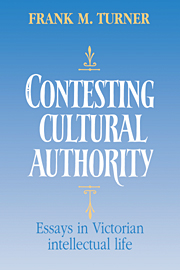Book contents
- Frontmatter
- Contents
- Preface
- I SHIFTING BOUNDARIES
- II SCIENCE AND THE WIDER CULTURE
- III MODERNS AND ANCIENTS
- 9 British politics and the demise of the Roman republic: 1700–1939
- 10 Ancient materialism and modern science: Lucretius among the Victorians
- 11 Virgil in Victorian classical contexts
- 12 The triumph of idealism in Victorian classical studies
- Index
11 - Virgil in Victorian classical contexts
Published online by Cambridge University Press: 22 September 2009
- Frontmatter
- Contents
- Preface
- I SHIFTING BOUNDARIES
- II SCIENCE AND THE WIDER CULTURE
- III MODERNS AND ANCIENTS
- 9 British politics and the demise of the Roman republic: 1700–1939
- 10 Ancient materialism and modern science: Lucretius among the Victorians
- 11 Virgil in Victorian classical contexts
- 12 The triumph of idealism in Victorian classical studies
- Index
Summary
To explore Victorian classicism in its several manifestations is in a sense to pass through a wing of a very old house which virtually all the present generation have forgotten and perhaps never even visited but where once the entire family of another era gathered, where children were reared and where they played, and where earlier members of the family grew into intellectual maturity and adulthood. It is a part of the house that has stood long abandoned though not dismantled as other wings were added and other children came of age. Yet neither the architectural lines of the new structure nor the character of the later children inhabiting it would be the same without those earlier structures or the experiences that occurred in the now-uninhabited corridors. In that regard, to study Victorian classicism is to attempt to deal with Victorian culture on its own terms. It is to consider a topic much of which is today irrelevant but which held a centrality for the intellectual experience of the Victorian educated elites that is difficult for scholars at the end of the twentieth century even to begin to comprehend.
The Victorians inherited the documents, plastic remains, and architectural ruins of antiquity. They also inherited previous interpretations and uses of those ancient materials. But Victorian writers, scholars, commentators, and artists forged the classical tradition for themselves as they came to understand it and to use it in their own cultural contexts.
- Type
- Chapter
- Information
- Contesting Cultural AuthorityEssays in Victorian Intellectual Life, pp. 284 - 321Publisher: Cambridge University PressPrint publication year: 1993
- 2
- Cited by



